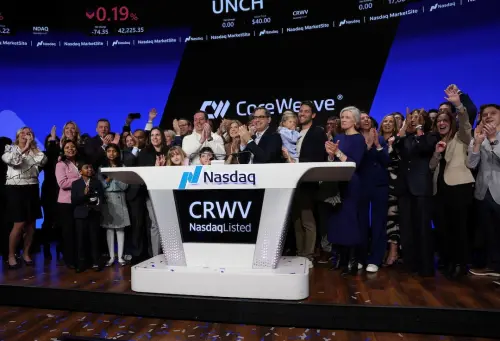CoreWeave's shares closed flat after opening nearly 3% below their offer price during its Nasdaq debut, giving the Nvidia-backed AI infrastructure firm a valuation of $23 billion on a fully diluted basis.
This lackluster performance raises concerns about the potential for a meaningful recovery in IPOs, particularly in light of turmoil in equity markets linked to tariffs. Wall Street experienced a sharp decline, with the tech-heavy Nasdaq dropping 2.7%.
The situation may also dampen sentiment towards AI infrastructure, amid mounting uncertainty regarding Big Tech's substantial spending and fears of competition from lower-cost alternatives, such as China's AI startup DeepSeek, which requires fewer chips.
CoreWeave's stock opened for trading at $39, compared to the IPO price of $40. The company had already encountered challenges the previous day.
Kamran Ansari, managing partner at Kapital Ventures, remarked on market receptiveness, noting that while CoreWeave's growth has been remarkable, its long-term sustainability remains unproven.
Nvidia supported CoreWeave's IPO with a $250 million order as part of a total raise of $1.5 billion. According to Dealogic, this IPO marks the largest AI-related listing by amount raised since 1995.
Investors have previously driven valuations of AI-focused companies like Oracle and Microsoft to significant heights; however, both companies, which may be viewed as comparables to CoreWeave, have seen their shares fall by 13% and 7% this year, respectively.
CoreWeave raised concerns among risk-averse investors as they weighed its long-term growth prospects against financial risks and capital intensity in a volatile market.
CoreWeave CEO Mike Intrator emphasized in an interview that the infrastructure necessary for delivering artificial intelligence represents a significant market opportunity, stating that demand from clients building that infrastructure remains robust.
Based in Livingston, New Jersey, CoreWeave provides access to data centers and high-performance Nvidia chips, essential resources in the race to develop AI applications. Nevertheless, 77% of CoreWeave's revenue last year was derived from its top two customers, including Microsoft.
During its IPO roadshow, some investors expressed concerns regarding CoreWeave's future due to potential shifts in Microsoft's AI data center strategy, which could impact long-term chip demand. In response, Intrator pointed out that the OpenAI contract would materially reduce client concentration and that they plan to continue diversifying their client base in the coming years.
CoreWeave recently secured an $11.9 billion five-year contract with OpenAI in advance of the IPO, establishing a partnership with one of the industry's leading startups. The company's executives also confirmed that their contracts with Microsoft remain intact, with no commitments canceled or withdrawn.
Initially founded as an Ethereum-focused crypto miner in 2017, CoreWeave transitioned to AI a few years later, discontinuing its mining business after Ethereum's "Merge" reduced rewards for miners. The company's revenue has surged dramatically, increasing more than eight-fold last year.
As of last year, CoreWeave reported around $8 billion in debt and announced plans to use approximately $1 billion of the IPO proceeds to repay some of it. The company leases its 32 data centers and some equipment rather than owning them, leading to operating lease liabilities of $2.6 billion.
The IPO was underwritten by a syndicate of 18 banks, including Morgan Stanley, JPMorgan, and Goldman Sachs.
